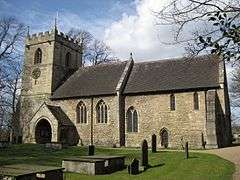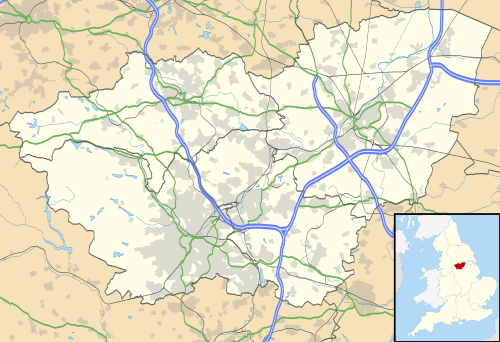Hooton Pagnell
| Hooton Pagnell | |
 All Saints Church |
|
 Hooton Pagnell |
|
| Population | 201 (2011) |
|---|---|
| OS grid reference | SE452078 |
| Civil parish | Hooton Pagnell |
| Metropolitan borough | Doncaster |
| Metropolitan county | South Yorkshire |
| Region | Yorkshire and the Humber |
| Country | England |
| Sovereign state | United Kingdom |
| Post town | Doncaster |
| Postcode district | DN5 |
| Dialling code | 01977 |
| Police | South Yorkshire |
| Fire | South Yorkshire |
| Ambulance | Yorkshire |
| EU Parliament | Yorkshire and the Humber |
| UK Parliament | Doncaster North |
Coordinates: 53°33′54″N 1°19′01″W / 53.565°N 1.317°W
Hooton Pagnell is a village and civil parish in the Metropolitan Borough of Doncaster in South Yorkshire, England, on the border with West Yorkshire. It lies on the B6422 road, near South Elmsall and is located at approximately 53°34′N 1°16′W / 53.567°N 1.267°W, at an elevation of around 80 metres above sea level. It has a population of 211,[1] reducing slightly to 201 at the 2011 Census.[2] The name of the village derives from Ralph de Paganel (sometimes spelled Paynell), a Norman who was a tenant-in-chief in Yorkshire named in the Domesday Book and an extensive landowner.[3]
History
The first recorded mention of Hooton Pagnell is found in Domesday Book, where it is called "Hotone" ("The Town on the Hill" or "The High Dwelling Place"). "In Hotone and Bileham Earl Edwin had one manor of ten carucetes for geld, and ten ploughs may be there.. . . . . . . . . In the time of King Edward it was worth eight pounds, now one hundred shillings." The 200 acres, that was in 1086 the extent of the cultivated land in Hooton, were given to Robert, Count of Mortain. He in turn sublet the land to Richard de Surdeval, a Norman knight.
The village was variously called "Hoton", "Howton", "Hutton", the second part of the name being added during the time of the Paganals, a distinguished Norman family into whose hands the manor passed towards the end of the 11th Century. The second part of the name is variously spelt - "Paynel", “Painell", "Pannell", "Pagnell". Hence, "Hooton Pagnell" - "The High Dwelling Place of the Paynels':
The village received a Royal Charter in 1253 entitling it to hold a market on Thursdays and an annual three-day fair. A butter cross was built, the base of which survives, but the market and fair soon ceased. However the fair has since been revived and is held very first Sunday in July[4][5] The ownership of Hooton remained in the hands of the Paganels and their heirs till the reign of Edward IV through the names of Paganel, and through marriage, Luterel and Hilton.
Hooton Pagnell Hall and the Estate
Much of the property in the village belongs to the estate of Hooton Pagnell Hall, which has been in the family of former Lord Mayor of London Sir Patience Warde since the 17th century. Before that it was owned by Sir Richard Hutton of Goldsborough Hall who bought the estate in 1605.[6] Hutton's descendent Col Robert Byerley, of Byerley Turk fame, sold the hall and estate to Sir Patience Warde in 1703.[7] With increased wealth, the Hall was extensively restored in Victorian times: following the sale of many large properties to meet death duties, the estate is now owned by a family trust. Mary Betty Norbury received the Hooton Pagnell estate as a gift from her father, Col William St Andrew Warde-Aldam, in 1952, and she and her husband assumed the surname of Warde-Norbury by Royal Licence in 1958.[8]
Hooton Pagnell Church
Close to the hall is the parish church of All Saints: a Norman square-towered church. Originally built in Norman times, the church was white-washed during the Reformation. With the revival of ritual as a result of the Oxford Movement, the church was restored to a more High Church style in the 1870s by the wife of the owner of the estate, Julia Warde-Aldam, who also restored the church in the neighbouring village of Frickley. The Warde-Aldam's wealth was based on land-ownership but was boosted significantly by the exploitation of coal reserves in the estates land with the sinking of Frickley colliery, located in South Elmsall, West Yorkshire.
Politics
Being an estate village, politics were traditionally dominated by the local landowenrs and by the church since Hooton Pagnell has its own vicar up to 1979. As the economics of the village have changed, it has become a commuter village in one of the very few Conservative wards in the Metropolitan Borough of Doncaster. The Village lies in the constituency of Doncaster North and the local MP is Ed Miliband.
St Chad's College, Durham
In 1902 the Revd F S Willoughby, vicar of Hooton Pagnell Parish, near Doncaster, opened a small hostel in which he prepared men of limited means to enter one of the established theological colleges. In this venture he enjoyed the support of Julia Warde-Aldam, who was the wife of the local squire. The success of this project encouraged Fr Willoughby in the hope that his students would have a chance to read for a university degree while doing their theological training: at the time, this was only possible at Oxford and Cambridge.
Willoughby was fortunate to attract the financial support of Douglas Horsfall, a wealthy Liverpool businessman and devoted churchman. Horsfall's financial support made it possible to establish St Chad's Hall, which was licensed in 1904 by the Durham University Senate as the first independent hall of the University. University College (the Castle) and Hatfield Hall, both owned by the University, were already established, as was the Women's Hostel, later to become St Mary's College. At the time, Durham University was very small, indeed so small that its continued existence was in some doubt.
St Chad's students were admitted to read for the full range of Durham degrees. In the early years, most students, though not all, pursued ordination training after their degree. The St Chad's Hostel at Hooton Pagnell was retained by the College until 1916 as a preliminary place of study to prepare students to qualify for university matriculation at Durham.[9] With the removal of the theological college to Durham, the Hostel was bequeathed to the village by the Warde-Aldham family as a village club.
References
- ↑ Office for National Statistics : Census 2001 : Parish Headcounts : Doncaster Retrieved 27 August 2009
- ↑ "Civil Parish population 2011". -Neighbourhood Statistics. Office for National Statistiucs. Retrieved 7 March 2016.
- ↑ A Topographic Dictionary of England, Samuel Lewis (editor), 1848, Institute of Historical Research, British History Online
- ↑ "Hooton Pagnell". Hooton Pagnell. Retrieved 1 October 2013.
- ↑ David Hey, Medieval South Yorkshire
- ↑ A Topographic Dictionary of England, Samuel Lewis (editor), 1848, Institute of Historical Research, British History Online
- ↑
- ↑ "Philippa Margery Warde-Norbury 1938-2015". Peerage News.
- ↑ "St Chad's College". Dur.ac.uk. Retrieved 1 October 2013.
| Wikimedia Commons has media related to Hooton Pagnell. |